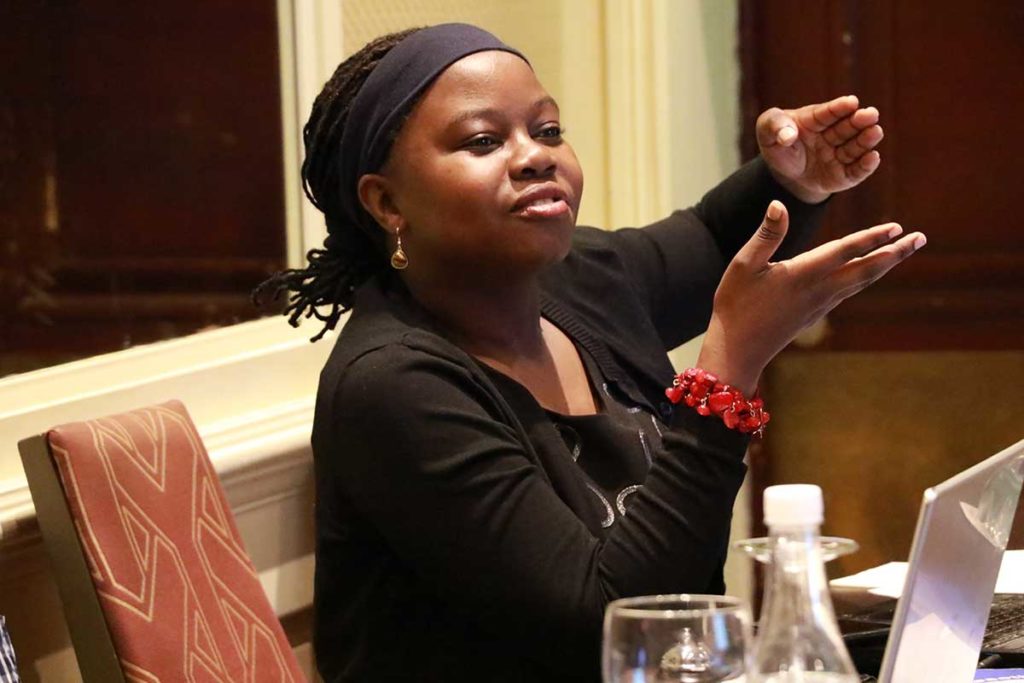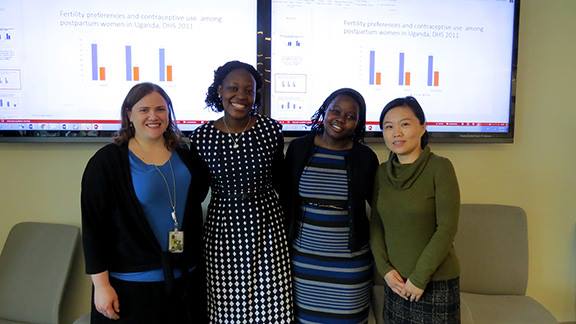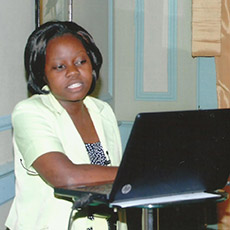Reflections from Elizabeth Nansubuga, a 2013 DHS Fellow
I was a DHS Fellow in 2013, part of a three-person team from the “Harvard of Africa,” Makerere University. The DHS Fellows Program came at a time when I had just enrolled for my doctoral studies in South Africa. As part of my doctoral studies, I had to apply advanced statistical techniques in analyzing maternal health-seeking behavior in Uganda using DHS data. Hence, the fellowship could not have come at a better time! It remains a remarkable experience to date, one that continues to impact my professional career.

Elizabeth Nansubuga co-facilitating the 2016 DHS Fellows workshop
Throughout The DHS Fellows Program, we were introduced to how to appropriately use DHS data and several analytical techniques using STATA software. These techniques were very useful in my doctoral studies. With the knowledge I acquired during the fellowship, I became known as a DHS data ‘expert’ among my peers and faculty colleagues and was able to share with them correct methods to analyze DHS data. It should come as no surprise that my Fellows teammate, Simon Kibira, acquired a further interest in the topic we worked on – male circumcision and HIV. He went on to pursue doctoral studies on the same topic.
After completing my doctoral studies at North West University, I returned to Makerere University and became a lecturer, which meant I would be teaching additional postgraduate courses. I have since been able to incorporate DHS data into my teaching materials. This was made easier with resources such as STATcompiler, DHS model datasets, and the mobile app – just a few of the numerous resources that Fellows are introduced to. And notably, since the fellowship, I had more confidence in supervising projects which used DHS data.

Sarah Staveteig, Patricia Ndugga, Elizabeth Nansubuga, and Wenjuan Wang after a presentation at The DHS Program headquarters
Later I had an opportunity with Ms. Patricia Ndugga, another former DHS Fellow and a colleague at Makerere University, to present our research based on DHS data to DHS staff at their Rockville, Maryland headquarters. Patricia presented an excerpt of her doctoral work, “Fertility preferences among postpartum women in Uganda.” Using the 2014-15 Uganda Malaria Indicator Survey, I presented my analysis “Determinants of three-dosage malaria intermittent preventive treatment among pregnant women in Uganda.” Here, we also received good feedback that greatly improved our work!
Afterward, I was invited to co-facilitate workshops during the 2016 Fellows Program. While I was happy to assist and share my knowledge and experiences, it was also an opportunity for me to continue enhancing my knowledge on DHS data and analytical skills, as well as to network with colleagues from other African countries.
Truly, there is nothing like The DHS Fellows Program that enhances one’s analytical and writing skills. It is also a Fellowship that enhances capacity building in universities. I encourage faculty engaged in demographic and health research to take advantage of this fellowship while it is offered.
Thanks to Elizabeth for contributing to The DHS Program blog! If you are interested in becoming a DHS Fellow, we are currently accepting applications for the 2017 program. Learn more here>>
Read some of Elizabeth and Patricia’s published work:
- Differences in risky sexual behaviors and HIV prevalence of circumcised and uncircumcised men in Uganda: evidence from a 2011 cross-sectional national survey
- Male Circumcision, Sexual Behavior, and HIV Status in Uganda
- Factors associated with modern contraceptive use among young and older women in Uganda: a comparative analysis
- Socio-Demographic Factors Associated with Contraceptive Use among Young Women in Comparison with Older Women in Uganda
 ELIZABETH NANSUBUGA is a faculty member in the Department of Population Studies at Makerere University, Uganda. She holds a Ph.D. in Population Studies. She is passionate about research that impacts policy and society. Her research interests are geared towards the improvement of maternal and child health with a major focus on characterization of maternal near misses. Her other research interests include sexually transmitted diseases, circumcision and gender issues. Her work is published in peer-reviewed journals. She is a recipient of several prestigious fellowships including the University of Michigan African Presidential Scholar, Population Reference Bureau Policy Communication Fellow, DHS Fellow, and African Doctoral Dissertation Fellow, among others. She has done consultancy work for several national and international organizations in the area of population and reproductive health. She is a member of several professional associations such as Public Health Association of South Africa (PHASA), Population Association of America (PAA), and Union for African Population Studies (UAPS).
ELIZABETH NANSUBUGA is a faculty member in the Department of Population Studies at Makerere University, Uganda. She holds a Ph.D. in Population Studies. She is passionate about research that impacts policy and society. Her research interests are geared towards the improvement of maternal and child health with a major focus on characterization of maternal near misses. Her other research interests include sexually transmitted diseases, circumcision and gender issues. Her work is published in peer-reviewed journals. She is a recipient of several prestigious fellowships including the University of Michigan African Presidential Scholar, Population Reference Bureau Policy Communication Fellow, DHS Fellow, and African Doctoral Dissertation Fellow, among others. She has done consultancy work for several national and international organizations in the area of population and reproductive health. She is a member of several professional associations such as Public Health Association of South Africa (PHASA), Population Association of America (PAA), and Union for African Population Studies (UAPS).

Well done Nansubuga.